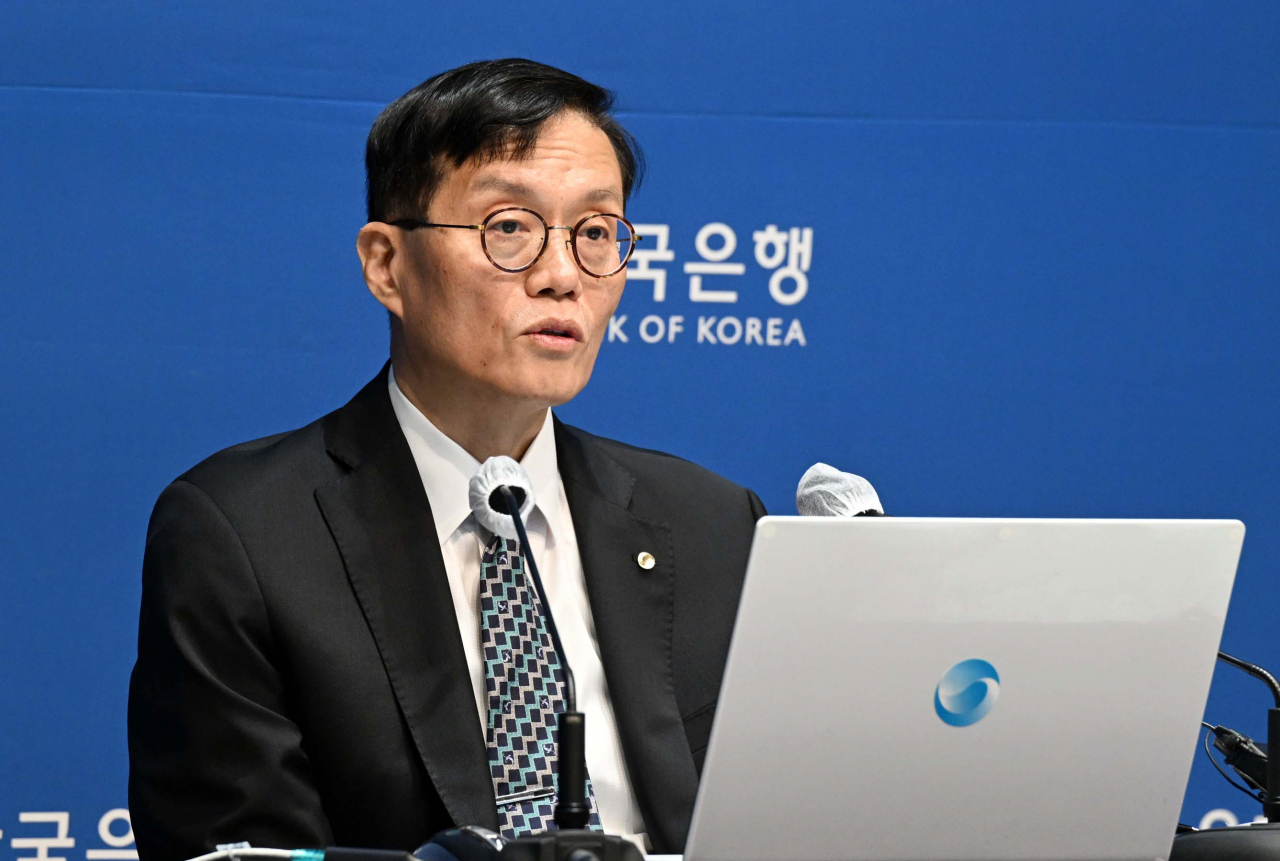BOK extends rate pause amid cooler inflation
Korea-US rate gap is likely to widen to 2 percentage points this month
By Im Eun-byelPublished : July 13, 2023 - 15:04

The Bank of Korea kept the base rate unchanged at 3.5 percent Thursday, going for a fourth consecutive freeze as inflation has shown signs of cooling down significantly.
The six-member monetary policy board unanimously voted for a rate freeze, while agreeing to keep the terminal rate at 3.75 percent, BOK Gov. Rhee Chang-yong said at a press conference held shortly after the rate-setting meeting.
The central bank was able to maintain the rate, as inflation has been giving firmer signs of easing, with the consumer prices index growth falling to 2.7 percent last month, coming down to below the 3 percent level for the first time in 21 months.
The core inflation rate, stripping out volatile food and fuel costs, also dropped to 3.5 percent, marking a 0.4 percentage fall from a month before.
Yet, inflationary concerns still remain. The recent cooldown of inflation stems from the base effect of the price jumps from last year when international oil prices spiked, rather than policymakers tamping down the soaring prices.
The BOK projected the consumer prices index growth to rebound soon as the base effect wears off.
“The consumer prices growth will continue to slow down until July, but will rebound in August and fluctuate around 3 percent by the end of this year, making the yearly figure stand at 3.5 percent as in the projection made in May,” Rhee said.
Another factor causing inflationary concerns is the hikes in public utility charges. Following the increases in electricity, gas charges earlier this year, the Seoul Metropolitan Government announced Wednesday it will raise subway and bus fares within the coming months.
“The hikes in public utility charges up until now have been included in the prices growth projection made earlier this year. But if there are further increases, the figure will have to be adjusted,” Rhee said.
The country's tight labor market could also create upward pressure. Korea’s employment rate in June hit 63.5 percent, a record high since 1982. Its jobless rate dived to 2.7 percent, the lowest since 1999.
Though the robust labor market signals an economy on the recovery, it is likely to push wages higher, which could contribute to higher inflation.
With the rate freeze, the rate gap between Korea and the US remains at 1.75 percentage points. As the US Federal Reserve is expected to raise base rates by 25 basis points to 5.25 to 5.5 percent at the end of this month, the gap could widen to 2 percentage points.
The diverging rate differential between Korea and the US is associated with concerns about an outflow of foreign capital and heightened currency volatility.
Rhee, however, stressed that the rate gap is not the sole factor in both capital flow and currency liquidity. The governor has repeatedly stressed the BOK will not “mechanically” follow the Fed’s decisions.
“It is not that the BOK ignores the Korea-US rate gap. But (Korea’s financial market) does not depend solely on the rate gap,” Rhee said.
As Rhee said, the exchange rate is expected to remain stable despite the widening rate gap. The Korean won against the US greenback closed at 1,274 won Thursday, down 13.7 won from the previous day as the US CPI indicated signs of inflation cooling down. It was the first time for the won-dollar exchange rate to close in the 1,270 won range since June 16.
With the BOK in a tough position, the market expects the central bank to freeze the rate at its next meeting in August.
“At the press conference, Rhee said the BOK needs to keep a watch on if the Fed will carry out two rounds of rate increases until September. This shows the monetary policy board will freeze the base rate in its August meeting unless inflation yields surprise," Kang Seung-won, an analyst from NH Investment & Securities, said.
Though some initially expected a rate cut to happen within this year, that projection has been delayed to next year.
“The beginning of rate cuts has been delayed, following the recent rebound in household debt and the Fed’s continued aggressive monetary tightening,” analyst Lim Jae-kyun from KB securities said, suggesting that the BOK could start to lower the rate in the second quarter of 2024.




![[KH Explains] No more 'Michael' at Kakao Games](http://res.heraldm.com/phpwas/restmb_idxmake.php?idx=644&simg=/content/image/2024/04/28/20240428050183_0.jpg&u=20240428180321)














